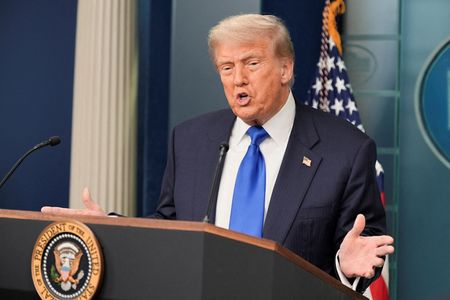By Nate Raymond
BOSTON (Reuters) -President Donald Trump's effort to curtail birthright citizenship was declared unconstitutional by a second U.S. appeals court on Friday, handing him another defeat on a core piece of his hardline immigration agenda whose ultimate fate may lie with the U.S. Supreme Court.
A three-judge panel of the Boston-based 1st U.S. Circuit Court of Appeals upheld injunctions won by Democratic-led states and immigrant rights advocates that have stopped the Republican president's executive order from taking effect nationwide.
Trump's order, issued on his first day back in office on January 20, directs agencies to refuse to recognize the citizenship of U.S.-born children who do not have at least one parent who is an American citizen or lawful permanent resident, also known as a "green card" holder.
U.S. Circuit Judge David Barron said Trump's order violated the U.S. Constitution's 14th Amendment, which states that anyone born in the United States is considered a citizen. He said the length of the court's 100-page ruling should not be mistaken for a sign that the fundamental question was difficult.
"It is not, which may explain why it has been more than a century since a branch of our government has made as concerted an effort as the Executive Branch now makes to deny Americans their birthright," Barron wrote in an opinion joined by two judges similarly appointed by Democratic presidents.
White House spokesperson Abigail Jackson said the court had misinterpreted the 14th Amendment.
"We look forward to being vindicated by the Supreme Court," she said in a statement.
The 1st Circuit was reviewing rulings by U.S. District Judges Leo Sorokin in Boston and Joseph Laplante in Concord, New Hampshire, who earlier this year in separate cases blocked Trump's order from being implemented.
The 1st Circuit's decision came after another appeals court, the San Francisco-based 9th U.S. Circuit Court of Appeals, in July similarly upheld a nationwide injunction blocking Trump's order from taking effect on the grounds that it violated the citizenship clause of the 14th Amendment.
The administration last week asked the U.S. Supreme Court to hear its appeal in that case and a related one. If the Supreme Court agrees, it would mark the second time the litigation is before the high court, after its 6-3 conservative majority in June limited the power of judges to block that and other actions by Trump on a nationwide basis.
The Supreme Court at that time did not weigh in on the validity of Trump's birthright citizenship order. But in three cases where judges had declared it unconstitutional, the court limited the ability of judges to issue so-called universal injunctions and directed lower courts that had blocked Trump's policy nationally to reconsider the scope of their orders.
The Supreme Court's ruling opened the door to Trump's order taking effect in parts of the country. Yet judges have repeatedly since then kept blocking it nationwide.
Those judges include Sorokin, who reaffirmed his original decision to halt the policy nationwide, and Laplante, who issued a new injunction in a newly-filed nationwide class action, a vehicle the Supreme Court's ruling suggested was permissible.
(Reporting by Nate Raymond in Boston, Editing by Alexia Garamfalvi and Rosalba O'Brien)







